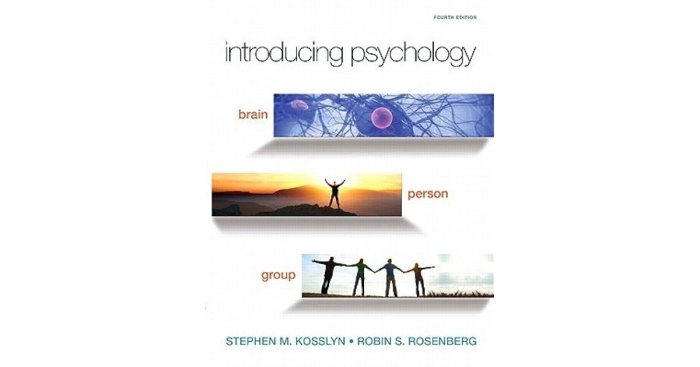Introducing psychology brain person group v5.1 – Embark on a captivating journey into the realm of psychology with “Introducing Psychology: The Brain, the Person, the Group (v5.1)”. This comprehensive guide unravels the intricate workings of the human mind, exploring the interplay between the brain, the individual, and the social context.
Delve into the depths of human consciousness, unraveling the complexities of the self, the motivations that drive behavior, and the profound influence of social interactions on our thoughts and actions. Discover how psychology shapes our understanding of mental health, education, and the workplace, empowering us to harness its insights for personal growth and societal well-being.
1. Introduction to Psychology: Introducing Psychology Brain Person Group V5.1

Psychology is the scientific study of mind and behavior. It is a diverse field that encompasses a wide range of topics, from the basic mechanisms of perception and learning to the complex social and emotional processes that shape our lives.
There are many different perspectives and approaches within psychology, each with its own unique assumptions about the nature of mind and behavior. Some of the most common perspectives include:
- The biological perspective, which focuses on the role of the brain and nervous system in behavior.
- The cognitive perspective, which focuses on the role of mental processes, such as thinking, memory, and attention, in behavior.
- The behavioral perspective, which focuses on the role of learning and environmental factors in behavior.
- The humanistic perspective, which focuses on the role of free will, personal growth, and self-actualization in behavior.
- The psychodynamic perspective, which focuses on the role of unconscious processes, such as dreams and repressed memories, in behavior.
2. The Human Brain
The human brain is the most complex organ in the body. It is responsible for controlling everything from our thoughts and emotions to our movements and bodily functions.
The brain is divided into two hemispheres, the left and the right. The left hemisphere is responsible for logical thinking, language, and mathematics. The right hemisphere is responsible for creative thinking, emotions, and spatial reasoning.
The brain is made up of billions of neurons, which are cells that communicate with each other through electrical and chemical signals. These signals are processed by the brain’s various regions, which work together to control our behavior.
3. The Individual Person

The individual person is the focus of much research in psychology. Psychologists are interested in understanding what makes us unique, how we develop, and how we interact with the world around us.
One of the most important concepts in psychology is the self. The self is the sense of who we are, our unique identity. It is made up of our thoughts, feelings, beliefs, and values.
The self develops over time as we interact with the world around us. Our experiences shape our self-concept, and our self-concept influences our behavior.
4. Social Psychology

Social psychology is the study of how people think, feel, and behave in social situations. Social psychologists are interested in understanding how our thoughts, feelings, and behaviors are influenced by the presence of others.
One of the most important concepts in social psychology is social influence. Social influence is the process by which one person’s thoughts, feelings, or behaviors are influenced by another person or group.
There are many different types of social influence, including:
- Conformity, which is the tendency to change our behavior to match the behavior of others.
- Obedience, which is the tendency to follow the orders of an authority figure.
- Persuasion, which is the process of changing someone’s beliefs or attitudes.
5. Applications of Psychology

Psychology is a diverse field with a wide range of applications. Psychologists work in a variety of settings, including schools, hospitals, businesses, and government agencies.
Some of the most common applications of psychology include:
- Clinical psychology, which is the use of psychology to diagnose and treat mental disorders.
- Educational psychology, which is the use of psychology to improve teaching and learning.
- Industrial-organizational psychology, which is the use of psychology to improve workplace productivity and employee satisfaction.
- Forensic psychology, which is the use of psychology in the criminal justice system.
- Health psychology, which is the use of psychology to promote health and well-being.
User Queries
What is the scope of psychology as a scientific discipline?
Psychology encompasses the study of the mind, behavior, and cognitive processes, aiming to understand and explain the full spectrum of human experiences, from perception and learning to emotions and social interactions.
How does the brain influence psychological disorders?
The brain plays a crucial role in the development and manifestation of psychological disorders. Dysfunctions in brain structures and neurochemical imbalances can contribute to conditions such as anxiety, depression, and schizophrenia.
What are the key factors that influence personality development?
Personality development is shaped by a complex interplay of genetic predispositions, environmental influences, and social experiences. Early childhood experiences, parenting styles, and cultural norms all contribute to the formation of an individual’s unique personality traits.